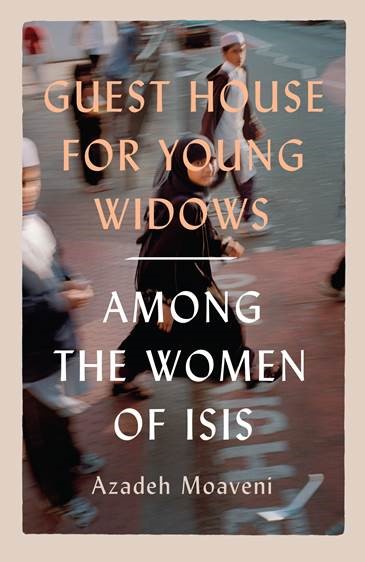December 2014, East London
Sharmeena’s father was surprised she had not yet returned home. The rain spattered against the windows and he imagined her without an umbrella, perhaps slipping into the mosque on the way. Finally, as he was preparing to leave for work at the restaurant, he rang her mobile. It went straight to a message in a foreign language. He called the police. A few hours later, they told him the language was Turkish and that it was likely Sharmeena had travelled to Syria to join the Islamic State.
Later, scanning her mobile phone bill, he could see that she had spent several days in Turkey before crossing into Syria – days during which the police were aware of her intention. He would wonder why the British police had not coordinated with Turkish authorities to stop his teenage daughter from crossing the border.
Two days later, the girls came to visit him. Kadiza, Amira and Shamima sat in a row on the sofa, their innocent eyes staring at the fleur-de-lis pattern on the brown carpet, seemingly bereft at the peculiar vanishing of their best friend. Sharmeena’s father quizzed them: ‘Come on, you guys were so close.’ But they swore up and down they knew nothing. ‘Really, Uncle, we had no idea. She was always on her phone. We kept asking her what was going on, but she said she’d tell us later.’
Two weeks later, Sharmeena called her father. ‘I’m happy here. I went by my own decision. Don’t worry about me, I’ll be okay,’ she said. He asked where she was, insisted that he would come and get her, no matter what. ‘No, you can’t come here, Baba,’ she said, tearful. Her broken voice made him cry too.
At Bethnal Green Academy, administrators called the girls – Kadiza, Amira, and Shamima, along with four others – into the office to meet with counterterrorism police. They were asked to answer questions about their best friend’s disappearance, and to give evidence, without their parents present. Were they criminals? Would they be put in prison? The girls, threatened and nervous, focused on speeding up their own departure and ensuring that no one got scared and ducked out of the plan. The police handed them letters to give to their parents. The girls, of course, pocketed them.
Less than two weeks after Sharmeena left, Amira, the popular Ethiopian girl, tweeted, ‘If you are three [in number], then let not two engage in private conversation excluding the third.’ The girls grew sloppy with their homework – until then always reliably completed – but their teachers didn’t notice. Because the school had only called the girls’ parents to say that Sharmeena had ‘gone missing,’ leaving out the crucial ‘to join ISIS’ bit, their families had no reason to suddenly grow watchful – to check whether their daughters were doing their homework, or to start monitoring their social media. Kadiza’s sister would often ask her if she’d had news of Sharmeena, but each time she repeated, oddly, ‘Well, I don’t know, I don’t know.’
Amira’s persona on social media, posted under UmmUthmanBritaniya and until then mostly concerned with fashion, soccer, and school, pivoted to talk of politics and religion. She and Kadiza, her bookish friend who excelled at school, shared images of injured Muslim children in Syria, and also Myanmar, where the plight of Rohingya Muslims – which the world would finally notice in 2017 – was already a focus of online Muslim activism. Amira was transfixed by the extreme violence that accompanied Syria’s civil war, a conflict that had raged without any outside intervention to protect civilians. She posted a quotation of a young Syrian boy’s last words before death, with the caption ‘This always gets to me.’ and an image of a Syrian toddler with a bowl haircut and eyes full of tears, eating dried bread. Throughout the Syrian war, both the regime and armed groups used and invoked violence against women and honour codes as a way of galvanizing support. Amira, listening to the rhetoric of one side, believed the jihadists were fighting valiantly to defend and protect the honour of women: ‘Hearing these stories of sisters being raped makes me so close to being allergic to men, Wallah,’ she wrote that winter of 2014.
Amira also grew more attuned to the vulnerability of Muslims living in the West and the Islamophobic hate crimes they endured. She tweeted and shared posts about a spate of events that occurred in one four-month period, stretching from November 2014 to February 2015: three Muslim students were murdered in Chapel Hill, North Carolina; shots were fired at a Montreal Muslim school; a Houston mosque was set ablaze by arson; a hijabi woman was thrown in the path of an underground train; online anti-Muslim vitriol was stoked by the film American Sniper, which celebrated a soldier who killed many civilians in the Iraq War. Amira’s tweets reflected genuine distress and bewilderment at popular culture, which seemed to construct a world in which Muslims were the perpetual aggressors, never the victims of violence.
The women who had already travelled to the caliphate echoed this in their online discussions. ‘The killings of innocent muslims is not just collateral damage tolerated by leaders of the west, but also directed by them,’ tweeted a woman called UmmYaqiin. These messages sometimes segued into droll encouragement: ‘Hijra. Just do it,’ and contemporary images that embraced extreme modesty and yet also craved the public performance of social media, like a photo of two muhajirat posing before a Syrian field, with face veils that didn’t even include eye slits: ‘My sister and I.’

The above is an extract from Guest House For Young Widows by Azadeh Moaveni, available from Scribe, £16.99. Guest House For Young Widows was shortlisted for the Rathbones Folio Prize 2020.
Image © Levi Clancy
The post Sharmeena, Kadiza, Amira and Shamima appeared first on Granta.
Be First to Comment